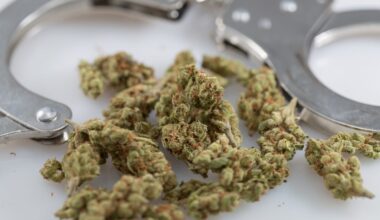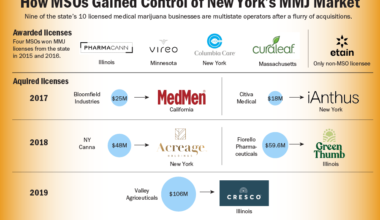The New York Police Department (NYPD) on Monday announced that, effective immediately, officers will no longer be subject to random, scheduled or pre-employment drug tests for marijuana as the state prepares to launch its retail cannabis market.
That’s a significant policy change for the nation’s largest police force, which employees about 36,000 officers.
NYPD says that it will continue to screen officers who are suspected of being intoxicated while on the job, according to a confidential document obtained and first reported by Leeroy Johnson of Viral News NY, but off-duty use that complies with state law will not be penalized.
I just spoke with the NYPD @NYPDDCPI
Here’s the statement they sent me pic.twitter.com/Flo9na8Sza— Viral News NY (@ViralNewsNYC) July 13, 2022
“The New York City Law Department (‘Law Department’) has issued a legal opinion regarding the Marihuana Regulation and Taxation Act (‘MRTA’), which went into effect on April 1, 2021, and amended the New York State Labor Law to prohibit adverse employment actions based on recreational marijuana use,” the document says.
“This legal opinion directed all City agencies, including the NYPD, to stop pre-employment, random, and scheduled drug testing for marijuana,” it continues. “The rationale behind this determination is that there is no test for marijuana that conclusively determines current intoxication, making it impossible to determine by drug test alone whether an employee has tested positive for marijuana because of improper use on the job or use during statutorily protected off-hours use.”
“Therefore, starting immediately, the Department should only drug test a member of service for marijuana if there is reasonable suspicion that the member is impaired by marijuana on the job in such a manner that impacts their job duties or where there is a federal requirement mandating testing for marijuana use, such as title which requires a Commercial Driver License.”
While the document was classified as confidential, an NYPD spokesperson confirmed the policy change to Marijuana Moment following its release, adding that the department “will continue to administer marihuana screenings to personnel when there is indications of impairment and is reviewing its current policies in light of this directive.”
Previously, officers who tested positive for THC would be subject to immediate termination.
This development comes more than a year after NYPD issued updated guidance to officers, notifying them that because cannabis was legalized for adult use, they are no longer able arrest adults 21 and older for simply using marijuana in places where smoking tobacco is permitted.
Last year, the state Department of Labor separately announced in guidance that New York employers are no longer allowed to drug test most workers for marijuana, with limited exceptions.
There’s been some controversy of police policy as it respects cannabis laws, including in neighboring New Jersey.
In May, New Jersey lawmakers introduced a series of bills meant to empower employers to punish workers—including law enforcement and other first responders specifically— from using marijuana off duty in compliance with state law.
The legislation was filed after a document was released by the state attorney general’s office explaining how New Jersey’s adult-use cannabis law currently allows police to use marijuana when they are not on the job.
Back in New York, retail cannabis shops have not yet opened as regulators work to finalize rules and start to approve licenses. However, adults 21 and older can possess and publicly consume marijuana, as well as gift it to other adults as long as they aren’t being compensated.
Some unlicensed businesses have reportedly been exploiting that gifting provision by selling non-marijuana products in exchange for “free” cannabis. Regulators recently said that they’ve issued dozens of warning letters to such businesses.
Bipartisan Lawmakers File Marijuana Protection Amendments For Veterans And People In Public Housing
Medical Disclaimer:
The information provided in these blog posts is intended for general informational and educational purposes only. It is not a substitute for professional medical advice, diagnosis, or treatment. Always seek the advice of your physician or other qualified healthcare provider with any questions you may have regarding a medical condition. The use of any information provided in these blog posts is solely at your own risk. The authors and the website do not recommend or endorse any specific products, treatments, or procedures mentioned. Reliance on any information in these blog posts is solely at your own discretion.







